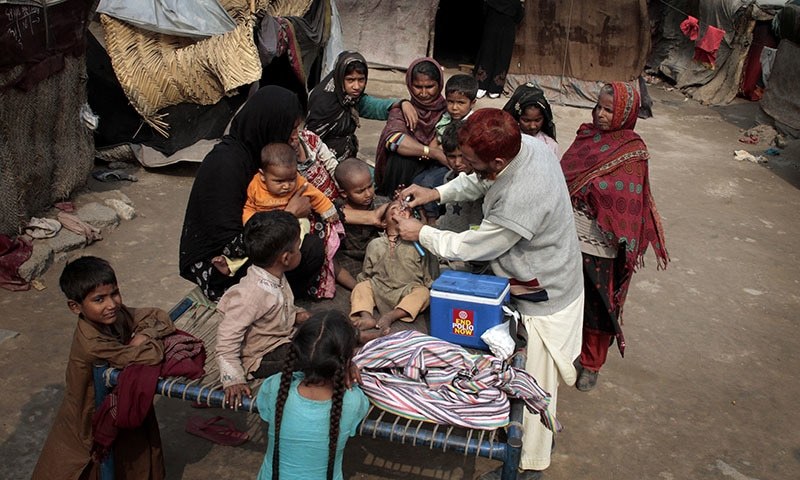Seven cases of Poliovirus type 2 detected in northern areas
ISLAMABAD: Seven cases of the vaccine-derived poliovirus type 2 — a type of the crippling disease for which vaccination in Pakistan were stopped in 2014 — have been detected in the northern areas of the country over the past few months, it has officially been confirmed.
Sources claimed that officials concerned had been reluctant for some time to admit that there was any case of the vaccine-derived poliovirus type 2 in the country.
“It is not a wild poliovirus outbreak. It is an outbreak of Sabin-Like Type 2 Derived (SLT2D). Similar outbreaks have been recently reported in Philippines, China, Indonesia, Nigeria, Democratic Republic of Congo and several other countries in Africa which have completely eradicated the poliovirus,” Special Assistant to the Prime Minister on Health Dr Zafar Mirza told media.
There are three serotypes of wild poliovirus type 1, type 2, and type 3 each with a slightly different capsid protein.Pakistan has been giving Type 1 and Type 3 viruses in Oral Polio Vaccines (OPVs), but had stopped administering Type 2 vaccine in 2014 and the virus could not be found even in environmental samples since 2016. An environmental sample is declared positive if virus is found in sewage water.
“However, suddenly cases have been reported from different areas which mean there was some vial left in some laboratory or somewhere else and started spreading due to human error. Just after getting the cases, which cannot be included in the number of wild polio virus, we sent samples to the lab of Centres for Disease Control and Prevention (CDC), Atlanta, and after getting the confirmation, that children were paralysed due to Type 2 polio virus, we have started polio campaigns,” Dr Mirza said.
He said the virus had caused seven cases of paralysis in recent months, mainly in the northern parts of the country. Outbreaks of polio occur where a large number of children were under-immunised, he added.
“The only way to reduce the risks of further transmission is to address gaps in immunisation coverage. The polio programme is working on a comprehensive outbreak response that includes rounds of vaccination in the area to protect every child under the age of five years. The programme has also enhanced its acute flaccid paralysis surveillance by active search for additional cases, increasing testing of contacts of cases and strengthening environmental surveillance,” he said.
He said through the Expanded Programme on Immunisation (EPI) schedule, children in Pakistan receive routine immunisation against 10 vaccine-preventable diseases (childhood tuberculosis, poliomyelitis, diphtheria, pertussis, tetanus, hepatitis B, haemophilus influenza type b, pneumonia, diarrhoea and measles). Through the service pregnant women are also vaccinated against tetanus.
The secretary of the Ministry of National Health Services, Dr Allah Bakash Malik, told Dawn that Dr Mirza had directly taken the challenge and he was being supported by the entire team in the ministry.


Comments are closed.